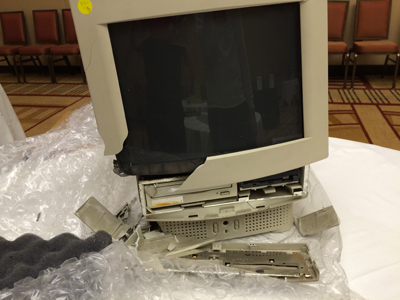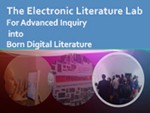Here’s a question I’d like to pose to those obsessive techies out there: would it matter at all to you if you had to read a vintage ebook as an emulation on the web, rather than read it on one of the machines it was originally built to be read upon? This is of at least a little interest to me, because (a) I have a collection of vintage laptops and so thus can be said to support maintaining the ecological niche of old electronics; and (b) a few months back, I picked up for my boys at Taco Bell a whole series of vintage Atari games (Pong, Asteroids, Centipede, etc.) which could only be played on a newish PC using the computer’s DVD drive, and I didn’t miss the experience of playing on the original hardware at all.
In support of “emulations are just fine, skip the original hardware,” here’s a story about the efforts of what I’ll call electronic literature archeologists to find and preserve some of the earliest examples of ebooks and books presented in an electronic-only format. As an illustration of the risks of relying too much on preserving the original-spec equipment to run the ebooks, here’s a cautionary tale of how the Electronic Literature Lab (ELL) For Advanced Inquiry into Born Digital Literature lost 4 of its 24 vintage MacIntosh computers in a shipping mishap, trying to get the computers to the January, 2014 convention of the Modern Language Association in Chicago. Life would’ve gone a whole lot smoother for the ELL folks if they’d only had to worry about transporting their software, not their hardware, too.
Here’s a description of the Electronic Literature Showcase which was held at the Library of Congress from April 3-5, 2013. The earliest example of an ebook in the program’s Featured Works dates to 1982, a work of “digital poetry” from Eduardo Kac entitled “Nao!”
For those of you who are interested in the Electronic Literature Lab For Advanced Inquiry into Born Digital Literature, here is their mission statement:
“The term ‘electronic literature’ applies to works that are created on a computer and meant to be read and experienced on a computer. [Dene] Grigar, a scholar and devotee of eLit, helped build a lab in which to preserve and enjoy works of vintage electronic literature. She helped create the Electronic Literature Lab at Washington State University Vancouver, which houses a collection of over 300 works of eLit — one of the largest collections in the world — and twenty eight vintage Macintosh computers on which to run them. Each computer has its appropriate OS version and, for browser-based works, appropriate browser versions.
“The ELL is never closed. Students with access rights can come and go at any time. Despite the age of the computers, they are all in good working condition. Grigar has someone who maintains the lab computers and keeps them tuned and running, and she uses a local computer-repair specialist for more serious technical issues.
“In addition to preserving the software disks on which the works reside, the ELL backs up and preserves their software in a repository. In some cases, the ELL keeps a copy of the software on the computer on which the work is played rather than go through the whole re-installation process; on the older computers that could require loading several disks. For CD-based works, they make an ISO image backup copy.
“The ELL has a searchable database to track all the works, the computers, operating systems and software requirements. If a user wants to view a work, he or she would search for it and, according to its requirements, locate which lab computer to use.”
Pretty interesting, huh? I’m happy to see that I’m not the only person out there who is fascinated by vintage electronics and the vintage software that runs on them.






